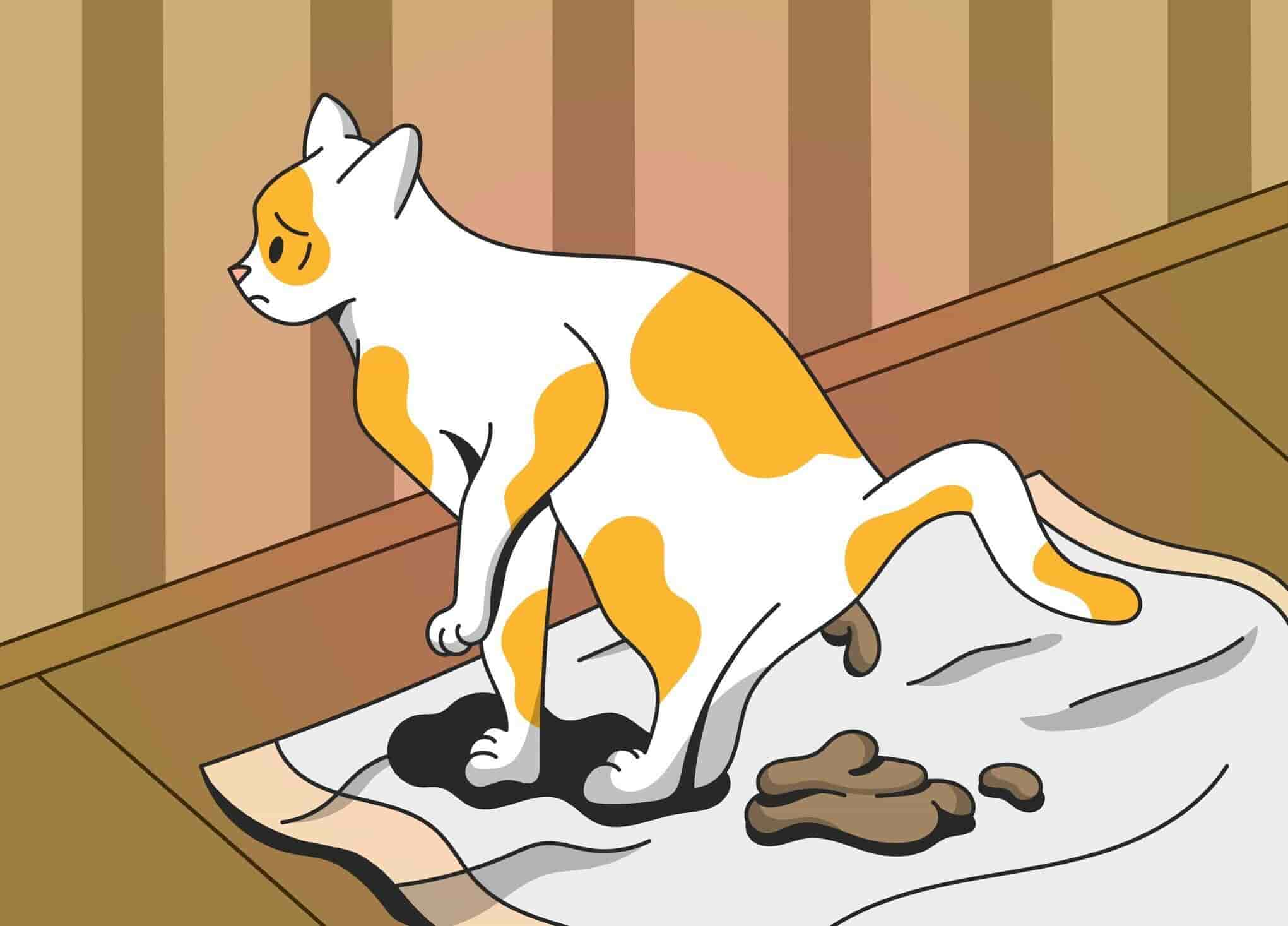If you are owned by a cat, you may know that cats are masters at hiding when they aren't feeling well. This is largely a defense mechanism inherited from their wild relatives. In the wild, a cat that shows signs of illness, weakness, or injury is an immediate target.
Because of this, you'll need to become familiar with the less apparent signs your cat may be sending you to communicate how they're feeling.
This article was reviewed by our expert veterinarian, Chris Vanderhoof (DMV).
Some signs can be as subtle as a shift in energy levels, play behavior, and appetite, but others are much less subtle. And there's nothing subtle about diarrhea. You may have spotted some less-than-firm poops in the litter box, or worse – Sir Pounce didn't quite make it to the litter box.
Either way, cat diarrhea is a sign that you must pay attention to. It's a common ailment in cats and indicative of various health issues ranging from harmless to potentially fatal. Not every bout of the runs should send you into a panic for the well-being of your feline, but you should definitely take note.
We've put together this piece to help you know what may be causing your cat's diarrhea, how to treat it, and when to worry.
Signs and symptoms
As much as the idea is less than appealing, it's good to keep an eye on the contents of your cat's litter box. This allows you to spot anything unusual and see it in good time. This is obviously much easier for indoor cats using a litter box.
Diarrhea in cats refers to any stool which is looser than usual. It may even be more liquid than solid. If your cat has diarrhea, they'll poop more often than usual, and they might even have an accident in the house.
Most cases of diarrhea clear up on their own within a day or so, but diarrhea that continues for more than a few days should be seen by a vet. Other symptoms that indicate a severe problem are vomiting, and blood, mucus, or parasites in the stool.
Cat diarrhea and vomiting should always be treated with urgency. It could be one of the following potentially dangerous issues:
- Intestinal obstruction;
- Organ failure;
- Severe infection;
- Severe food allergy.
If your cat has bloody diarrhea, seek the advice of a vet as soon as possible. According to research, dark red or black blood in the stool can indicate bleeding higher up in the gastric tract, while bright red blood shows bleeding in the lower intestinal region.
Back to taking note of what’s in the litterbox, make sure you’re able to give a detailed description of the situation in there to the vet when you visit. They’ll need to know about frequency, color, consistency, and any other visible characteristics that might help them make a diagnosis.
Causes of cat diarrhea
Cat diarrhea can be caused by several things, but most commonly, it's related to something your cat has eaten. A sudden change in diet can cause digestive issues in your feline companion, so it's a good idea to introduce new foods gradually.
Other potential causes of cat diarrhea are:
- Intestinal parasites;
- Food allergies;
- Viruses;
- Pancreatitis;
- Medications;
- Liver disease;
- Bacterial imbalance in the gut;
- Hyperthyroidism;
- Toxins;
- Cancer.
Treatment
It can be highly distressing when your beloved feline is unwell, and we fully understand the temptation to reach for human medicines to offer some relief. In the case of diarrhea, you should never use human medications like Pepto-Bismol, as these can be extremely harmful to your cat.
If your cat seems to be feeling well and shows no other symptoms other than diarrhea which resolves on its own after a few hours, there's no cause for alarm. If diarrhea continues for more than a day, you should head to the vet.
If you spot mucus or blood in your cat's diarrhea or if your cat has diarrhea and vomiting, seek the help of a veterinarian without delay. Similarly, seek treatment as soon as possible if your cat is very young, very old, pregnant, or has a chronic condition.
If your cat just seems to have a regular bout of the runs, you can try to increase their fiber consumption. Chat to your vet about a fiber supplement or using canned pumpkin to help bulk up your cat's poop. If you do want to try canned pumpkin, check the label carefully. You want to use an un-spiced, unsweetened pumpkin.
Some cats may benefit from taking a feline-specific probiotic too. Probiotics for humans are not to be given to cats.
If you've tried using fiber and probiotics and your cat is still passing loose stools, a trip to the vet may be in order.
Prevention
Because so many things can cause diarrhea in cats, it's unlikely that you'll be able to prevent diarrhea altogether. That said, there are some things you can pay attention to that may help:
- Don't make sudden or drastic changes to your cat's food;
- Avoiding giving your cat human food or rich treats;
- Treat any underlying medical conditions such as pancreatitis and hyperthyroidism by giving the medication and diet prescribed by your vet.
You can also use your Petcube interactive cat camera with the help of which you will be able to see if your kitty counter surfs or eats anything they are not supposed to while you are away!
Online Vet and Emergency Fund with Petcube
When your cat has diarrhea, it can be hard to know if you should rush to the vet or if it can wait until morning. With Online Vet by Petcube, you can access a team of trained veterinarians in real-time at any time of day or night.
Read more: What To Expect From An Online Vet Visit
Get answers and advice in seconds from your phone or computer and take the stress and anxiety out of pet parenthood. No more appointments, no more guesswork. And all this for just $19.99 a month.
For an additional $9 a month, you can also have $3000 in emergency medical funds each year.
Those vet bills can rack up pretty fast if your cat has a more severe illness. An emergency fund can help you get through the trauma and ensure your kitty receives the necessary treatment.
FAQ
Is it serious if there is blood in cat diarrhea?
If your cat has bloody diarrhea, it's best to reach out to your vet to rule out anything serious. There are many reasons for your cat's bloody diarrhea; not all are dangerous. Most are mild and easily treatable, especially if caught and treated early.
What to do if my cat has diarrhea and vomiting?
The safest thing to do is get to a vet as soon as possible. If it's past closing time, you can wait until morning only if your cat isn't in pain, dehydrating, or passing blood.
Ensure your cat has access to plenty of fresh water to stay hydrated. Switch up their feeding schedule so they eat less but more frequently. Smaller portions will be more manageable on the stomach.
If your cat is usually an outdoor cat, it might be a good idea to keep them indoors for a while so you can keep an eye on how severe the vomiting and diarrhea are. That said, if it is too distressing for your cat, then don't force the issue.
How long will a cat have diarrhea after deworming?
It's common for cats to develop diarrhea after receiving their deworming medication. These symptoms should pass within two to three days. It's also likely that you might also see worms and some blood in the stool at this time, so don't be too alarmed.
Can I give my cat Imodium for diarrhea?
We would never advise giving human medication to your cat without the direction of your vet. While Imodium is one medication that is safe for cats, dosages for cats are much lower than for humans. Also, if your cat is already on medication for another condition, negative interaction is possible.
Is pumpkin for cat diarrhea good?
Pumpkin is loaded with soluble fiber and may help with mild cases of diarrhea. It does this by absorbing the excess water in the bowels, thereby firming up stools. You can mash up a boiled pumpkin at home or buy the canned variety. In the case of the latter, ensure no added ingredients like sugar, spices, or preservatives.
It's also a great addition to your cat's diet to prevent hairballs.
My cat has diarrhea and a red bum – what do I do?
A red butt can result from diarrhea in cats. The best thing to do to soothe the tush is to stop diarrhea which is causing the irritation. Give your vet a call to find out which over-the-counter ointments they may recommend that could help in the meantime until you get diarrhea under control.
My senior cat has diarrhea and vomiting – is it serious?
Because senior cats generally have a weaker immune system, even something mild can be cause for concern. For diarrhea in senior cats, we'd recommend getting to a vet sooner rather than later. Simple ailments can escalate quickly in cats older than 7 or 8 years and even faster in geriatric cats (14 years and older).

Was this article helpful?
Help us make our articles even better









